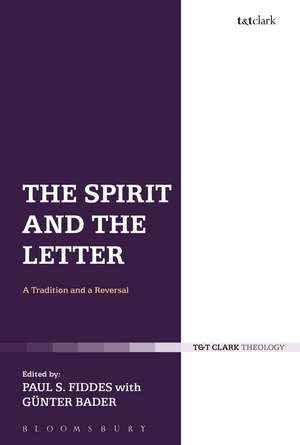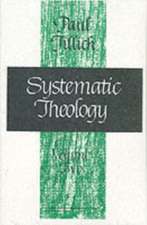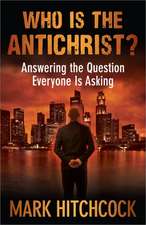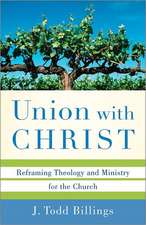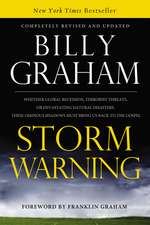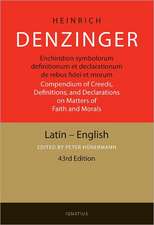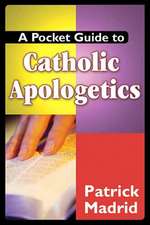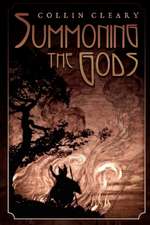The Spirit and the Letter: A Tradition and a Reversal
Editat de Professor Paul S. Fiddes, Professor Günter Baderen Limba Engleză Paperback – 28 ian 2015
| Toate formatele și edițiile | Preț | Express |
|---|---|---|
| Paperback (1) | 258.15 lei 6-8 săpt. | |
| Bloomsbury Publishing – 28 ian 2015 | 258.15 lei 6-8 săpt. | |
| Hardback (1) | 891.92 lei 6-8 săpt. | |
| Bloomsbury Publishing – 17 iul 2013 | 891.92 lei 6-8 săpt. |
Preț: 258.15 lei
Preț vechi: 295.74 lei
-13% Nou
Puncte Express: 387
Preț estimativ în valută:
49.40€ • 52.82$ • 41.19£
49.40€ • 52.82$ • 41.19£
Carte tipărită la comandă
Livrare economică 17 aprilie-01 mai
Preluare comenzi: 021 569.72.76
Specificații
ISBN-13: 9780567661494
ISBN-10: 0567661490
Pagini: 288
Ilustrații: black & white illustrations
Dimensiuni: 156 x 234 x 15 mm
Greutate: 0.4 kg
Editura: Bloomsbury Publishing
Colecția T&T Clark
Locul publicării:London, United Kingdom
ISBN-10: 0567661490
Pagini: 288
Ilustrații: black & white illustrations
Dimensiuni: 156 x 234 x 15 mm
Greutate: 0.4 kg
Editura: Bloomsbury Publishing
Colecția T&T Clark
Locul publicării:London, United Kingdom
Caracteristici
Clarifies the meaning and history of an influential yet ambiguous phrase in Christian tradition
Notă biografică
Paul S. Fiddes is Professor of Systematic Theology in the University of Oxford, and is Director of Research at Regent's Park College, Oxford, UK. Günter Bader was until recently Professor for Systematic Theology in the Protestant Theology Faculty of the University of Bonn, Germany.
Cuprins
Preface \ Part I: The Project \ Whatever Happened to a Pauline Text? 2 Corinthians 3.6 and its Afterlife, Günter Bader and Paul S. Fiddes \ Part II: Spirit and Letter: a Tradition \ 'Spirit' and 'Letter' in the New Testament, Michael Wolter \ Spirit and Letter: A Taxonomy of Modern Biblical Interpretation, Robert Morgan \ From Letter to Spirit to Letter: the Faith as Written Creed, Wolfram Kinzig \ Spirit and Letter in Origen and Augustine, Morwenna Ludlow \ Part III: Letter and Spirit: a Reversal \ The Late-Modern Reversal of Spirit and Letter: Derrida, Augustine and Film, Paul S. Fiddes \ Letter and Spirit in Schleiermacher's Speeches on Religion, Günter Badder \ Inspired Reading, Speaking and Listening: Letter and Spirit in Preaching, Michael Meyer-Blanck \ The Meaningful Death of Meaning: Tradition and Letter in Kafka and Scholem, Jochen Schmidt \ Spirit, Body and Letter, Oliver Davies \ Bibliography \ Index
Recenzii
For those intrigued by Paul's evocative phrase, this work's attention to the theological nuance of its implications will prove richly rewarding.
This is a work of serious and detailed scholarship, with each chapter offering a nuanced and complex interaction with the topic.
The "letters" of this interdisciplinary volume on 2 Corinthians 3.6 ("The letter kills, but the Spirit gives life") do not "kill" the reader, nor is there a spiritual reading that ignores these Pauline words. Instead, the vexing oppositional "but" is turned into an even more complex "and" that expresses the mutual dependency of death and life in the tension between spirit and letter. Leading theologians from Germany and the UK explore the life and after-life of this Pauline provocation, from exegesis and history to postmodern and remodern interpretations, to entangle the reader in an extraordinarily creative process whereby the letter becomes the embodied inspiration and the spirit flows not unwritten.
The extraordinarily rich theme of this book leads us through centuries of interpretation and debate. Its thorough, multi-faceted engagement with one biblical verse by a dedicated group from England and Germany, who met together over several years, inspires the reader to think and rethink core issues, from the nature of matter, language and texts to the human spirit, the Holy Spirit, power and salvation. It is itself, to use its own happy phrase, a "text open to spirit".
This is a work of serious and detailed scholarship, with each chapter offering a nuanced and complex interaction with the topic.
The "letters" of this interdisciplinary volume on 2 Corinthians 3.6 ("The letter kills, but the Spirit gives life") do not "kill" the reader, nor is there a spiritual reading that ignores these Pauline words. Instead, the vexing oppositional "but" is turned into an even more complex "and" that expresses the mutual dependency of death and life in the tension between spirit and letter. Leading theologians from Germany and the UK explore the life and after-life of this Pauline provocation, from exegesis and history to postmodern and remodern interpretations, to entangle the reader in an extraordinarily creative process whereby the letter becomes the embodied inspiration and the spirit flows not unwritten.
The extraordinarily rich theme of this book leads us through centuries of interpretation and debate. Its thorough, multi-faceted engagement with one biblical verse by a dedicated group from England and Germany, who met together over several years, inspires the reader to think and rethink core issues, from the nature of matter, language and texts to the human spirit, the Holy Spirit, power and salvation. It is itself, to use its own happy phrase, a "text open to spirit".
